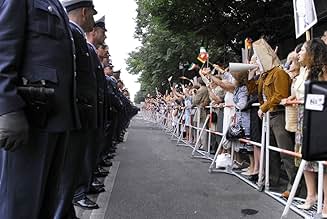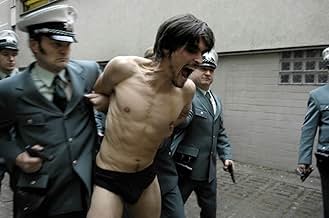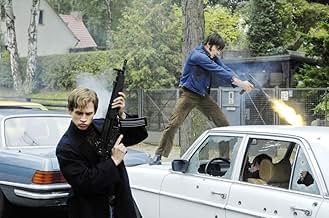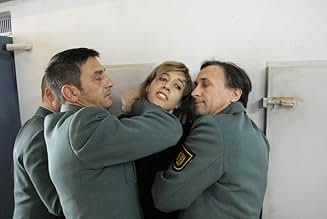PUNTUACIÓN EN IMDb
7,3/10
41 mil
TU PUNTUACIÓN
Una mirada al grupo terrorista de Alemania, The Red Army Faction (RAF), que colocó bombas y realizó robos, secuestros y asesinatos a fines de los años 60 y 70.Una mirada al grupo terrorista de Alemania, The Red Army Faction (RAF), que colocó bombas y realizó robos, secuestros y asesinatos a fines de los años 60 y 70.Una mirada al grupo terrorista de Alemania, The Red Army Faction (RAF), que colocó bombas y realizó robos, secuestros y asesinatos a fines de los años 60 y 70.
- Dirección
- Guión
- Reparto principal
- Nominado para 1 premio Óscar
- 4 premios y 22 nominaciones en total
Niels-Bruno Schmidt
- Jan Carl Raspe
- (as Niels Bruno Schmidt)
Hans Werner Meyer
- Klaus-Rainer Röhl
- (as Hans-Werner Meyer)
Reseñas destacadas
The movie of Edel and Eichinger is fine when it comes to sets and costumes. It seems to catch the mood of the late Sixties and Seventies very well. Also the lead actors Bleibtreu, Wokalek and Gedeck have delivered outstanding performances. Too bad, that they don't get a chance to really explore their characters: Too much else is going on in this movie, that completely loses its focus during the last hour. The closer we get to the end, the more it resembles a documentary with a few scenes of play cut in now and then.
The viewer is presented with a lot of facts - and violence - but the movie fails in decoding the often cited "myth" of the RAF. For example, I've always wondered, whether Baader was just a criminal or really politically motivated. Well, in the first half of the movie, Baader is portrayed as an outlaw, who enjoys provocation and fast cars. Later he delivers sophisticated political statements. A good movie should at least try to explain this development. DER BAADER MEINHOF KOMPLEX doesn't.
The viewer is presented with a lot of facts - and violence - but the movie fails in decoding the often cited "myth" of the RAF. For example, I've always wondered, whether Baader was just a criminal or really politically motivated. Well, in the first half of the movie, Baader is portrayed as an outlaw, who enjoys provocation and fast cars. Later he delivers sophisticated political statements. A good movie should at least try to explain this development. DER BAADER MEINHOF KOMPLEX doesn't.
I watched the movie at a teacher's screening in Wuppertal on a Sunday morning. I was quite impressed with the accurate and detailed portrayal of the RAF and the events of the so called 'German fall' (Deutscher Herbst). I myself knew of many of the events beforehand and thanks to documentaries such as Veiel's Black Box BRD and Breloer's Todesspiel I was able to compare. For the two and some hours that the movie lasted I was on the edge of my seat. None of the scenes were boring, everything was well paced (at times maybe a little too fast paced) and I felt like I was being taken back to the important past of my native country. However, at the end I felt a little empty. The documentaries I just mentioned focused on only one story, but these documentaries were better because they gave us an in-depth analysis of the opposing forces (the bourgeoisie, the elite and the socialist rebels).
The portrayal of Meinhof and Baader seems accurate, too, but often I wondered if Baader really was the small-time crook he's made out to be in the movie. Except for Meinhof and Ensslin nobody seems to have some really deep thoughts about what was (is) wrong with our society. Mohnhaupt played by Nadja Uhl isn't explained at all, she's just there all of a sudden and we just go along thinking that she is in it for the same reasons as everybody else (Which are???).That way the movie seemed a little biased, as if trying to tell us that the RAF was mainly criminal and not so much political. Although I believe that a lot of their motives were right, even though they didn't justify any of the actions.
Bruno Ganz as Herold is allowed to play his character in a way that everyone thinks of the German government at the time as a dignified and moderate administration although I don't believe that to be true (after all, Herold said that he can only cure the symptoms of the RAF disease but not the disease itself, yet he didn't do anything to make the German people understand that the RAF is not altogether wrong when it accuses the German people of laziness, cowardice and complacency).
Now, leaving the movie, I figured that there was nothing much left to talk about. The teacher material that we received was pretty useless, because it doesn't offer any interesting topics for discussion. I for one think it would be interesting to discuss the present situation (bureaucracy, war in Iraq, terrorism) with the situation of Germany in the 70's. We are still dealing with many of the problems that caused the insurgency and civil disobedience back then, yet today we don't do anything at all. We are dissatisfied with the Bush administration, we oppose the war in Iraq and Afghanistan, we suffer from a financial crisis mainly caused by the deregulated free market economy (capitalism) and we watch the divide between the rich and the poor getting bigger and bigger.
However, the youth of today doesn't protest. Why not? Maybe because we taught them well that in the end it's everyone for themselves and that it's best to be obedient, docile and commonorgarden if you want at least a little security in your life. One of the stronger scenes was the one where Ensslin accuses Meinhof of jerking off on her socialist theories instead of actually doing something. That's where you can see how Meinhof was influenced by the RAF. Finally she met some people who were willing to take action instead of just talking and philosophizing about a better world. This scene lends itself well to the follow-up scene in which Meinhof helps Baader to escape from prison. The jump from the window sill is a the same time a jump towards extremism.
Well, all in all, I think it's a good film to get people interested in Germany's past but it can only be the beginning of a more subtle analysis of what the RAF stood for and what it was trying to do.
The portrayal of Meinhof and Baader seems accurate, too, but often I wondered if Baader really was the small-time crook he's made out to be in the movie. Except for Meinhof and Ensslin nobody seems to have some really deep thoughts about what was (is) wrong with our society. Mohnhaupt played by Nadja Uhl isn't explained at all, she's just there all of a sudden and we just go along thinking that she is in it for the same reasons as everybody else (Which are???).That way the movie seemed a little biased, as if trying to tell us that the RAF was mainly criminal and not so much political. Although I believe that a lot of their motives were right, even though they didn't justify any of the actions.
Bruno Ganz as Herold is allowed to play his character in a way that everyone thinks of the German government at the time as a dignified and moderate administration although I don't believe that to be true (after all, Herold said that he can only cure the symptoms of the RAF disease but not the disease itself, yet he didn't do anything to make the German people understand that the RAF is not altogether wrong when it accuses the German people of laziness, cowardice and complacency).
Now, leaving the movie, I figured that there was nothing much left to talk about. The teacher material that we received was pretty useless, because it doesn't offer any interesting topics for discussion. I for one think it would be interesting to discuss the present situation (bureaucracy, war in Iraq, terrorism) with the situation of Germany in the 70's. We are still dealing with many of the problems that caused the insurgency and civil disobedience back then, yet today we don't do anything at all. We are dissatisfied with the Bush administration, we oppose the war in Iraq and Afghanistan, we suffer from a financial crisis mainly caused by the deregulated free market economy (capitalism) and we watch the divide between the rich and the poor getting bigger and bigger.
However, the youth of today doesn't protest. Why not? Maybe because we taught them well that in the end it's everyone for themselves and that it's best to be obedient, docile and commonorgarden if you want at least a little security in your life. One of the stronger scenes was the one where Ensslin accuses Meinhof of jerking off on her socialist theories instead of actually doing something. That's where you can see how Meinhof was influenced by the RAF. Finally she met some people who were willing to take action instead of just talking and philosophizing about a better world. This scene lends itself well to the follow-up scene in which Meinhof helps Baader to escape from prison. The jump from the window sill is a the same time a jump towards extremism.
Well, all in all, I think it's a good film to get people interested in Germany's past but it can only be the beginning of a more subtle analysis of what the RAF stood for and what it was trying to do.
First of all this is a very important film. Just like the other "Big" film by Eichinger "Der Untergang" it confronts the German audience (and the world should it care) with some aspect of German history that people should know about. In this case the "myth" of the RAF. To everyone who lived through the seventies in Germany it is clear that the influence of the RAF on Germany can hardly be exaggerated. I was a kid but my impression at the time was that both sides were wrong. There was a constant fear of terror coming from the terrorists but also from the state. (People did not get jobs if it was suspected they were "left".) So to make a blockbuster film, even if it does not really explain the motives of the main characters involved, at least gives us some facts. Not everyone is prepared to watch documentaries or read the book by Aust, but everyone should have some thoughts or maybe discussions on the subject.
Okay, but does it succeed as a film? Not entirely. The actors as everyone agrees were excellent, the cinematography as well. You do think you are in the seventies. That in itself is amazing. The action scenes are done splendidly, especially at the beginning the riots during the visit of the Persian Shah which culminated in the shooting of a student which in turn was, at least to some extent, the origin of the rise of terror. Of course the film is episodic and there are too many characters in it, most of them are not introduced in any way and ten years of complex history cannot be told in an altogether satisfying way. But the film succeeds in giving us a sense of what was going on. The producer, Bernd Eichinger has been accused of vanity. Which is a funny thing. Of course, he is vain. He has the duty to be vain as long as he also feels a responsibility to make movies that try to tell something. And the challenge, he feels, is to say it to as many people as possible.
Okay, but does it succeed as a film? Not entirely. The actors as everyone agrees were excellent, the cinematography as well. You do think you are in the seventies. That in itself is amazing. The action scenes are done splendidly, especially at the beginning the riots during the visit of the Persian Shah which culminated in the shooting of a student which in turn was, at least to some extent, the origin of the rise of terror. Of course the film is episodic and there are too many characters in it, most of them are not introduced in any way and ten years of complex history cannot be told in an altogether satisfying way. But the film succeeds in giving us a sense of what was going on. The producer, Bernd Eichinger has been accused of vanity. Which is a funny thing. Of course, he is vain. He has the duty to be vain as long as he also feels a responsibility to make movies that try to tell something. And the challenge, he feels, is to say it to as many people as possible.
Germans have a quality wave of movies that reached wold audience in the early 21st century, after the Run Lola Run hit. This movie is perhaps not the best of the best, but is interesting, original and gives a story of one turbulent era with great detail and precision.
Being aged, knowing most about the R.A.F story from the news when it happened (1970s) including the events in 1968 (Berlin, Prague , Mexico , U.S.A.) I am much more disappointed in this " big production' on a major theme in post war German (European) history, than most other critics up till now. If you know little or nothing about the subject, like many younger people, this may seem a " cool movie". Just as an action pic, you're right. However, what I miss, is the ideological context in which all this was happening. There is some mention of sectarian leftist groups, we see major mass protests of university students, etc. And the starting scenes in Berlin (visit of Sjah) are the main " background" to the " movement". (by the way, how many under 30 people knew about the Sjah of Persia, anyway? I even remember first spouse Soraya from the early 60's...). What I miss, is , an explanation of what and how on the mass student meetings, they are just shown. Also missing are the deeper context of postwar BRD (Germany) not having come to terms with the Nazi past, especially in the situation of many former NSDAP - symp's having high places in society, government, industry, etc. As I remember, that was one of the main frustrations in leftist circles ( and not only there...). Etcetera. In this respect, seeing the first gen. members of R.A.F. speeding to an unexplained action in BMW's on the " autobahn" as if they were fun-cruising L.A. in a Tarantino muscle-car flic while having My Generation by the Who on the stereo this all is quite unbelievable for people informed about that era. I don't believe these guys were jet-set-emulators. Jet-set was capitalist and thus their opposite social stratum. Which they fought , with all fatal results. And, why the story ending with the death of the first four, how shocking it may be? This whole episode is too much for one movie. As a Dutch proverb says: " they took too much hay on their fork". (meaning the makers of B.M. Komplex). genomen".
¿Sabías que...?
- CuriosidadesAs an immediate reaction to the movie, Ignes Ponto, widow of Jürgen Ponto, whose assassination is portrayed in the movie, returned her Federal Cross of Merit. She was angry that the Federal Republic of Germany has never even created a memorial for victims of the RAF, but instead helped to finance films like this one about the members of the RAF. Also, she said, she had not been warned about the graphic portrayal of Ponto's assassination when she was invited to the movie premiere and felt humiliated by the producers for making her sit through this without a warning. About a month later, she filed a lawsuit against the producers, who claimed that every scene is historically accurate, because the assassination of her husband, which she had to witness from the next room, was not portrayed as it happened. She demands the scene of the murder of her husband be cut from the movie. The filmmakers claim that they had tried to contact her during production to get the scene right but she had no desire to cooperate. Before this movie, there had been no portrayal of Ponto's assassination on film and she felt the staging of the movie was lurid and dishonoring to her husband. As of this writing, no decision has been reached about the lawsuit.
- PifiasUlrike Meinhof's twin daughters Bettina and Regine first appear in the opening scene in 1967 when they are 9 years old. Yet 3 years later when living in Sicily and rescued by Stefan Aust, they haven't aged at all.
- Citas
Ulrike Meinhof: If you throw a stone, it's a crime. If a thousand stones are thrown, that's political. If you set fire to a car it's a crime; if a hundred cars are set on fire that's political.
- ConexionesFeatured in Guinness World Records - Die größten Weltrekorde: Episodio #5.1 (2008)
- Banda sonoraMercedes Benz
Written by Janis Joplin, Michael McClure
Performed by Janis Joplin
Produced by Paul A. Rothchild
Selecciones populares
Inicia sesión para calificar y añadir a tu lista para recibir recomendaciones personalizadas
Detalles
- Fecha de lanzamiento
- Países de origen
- Sitio oficial
- Idiomas
- Títulos en diferentes países
- RAF: Facció de l'Exèrcit Roig
- Localizaciones del rodaje
- Empresas productoras
- Ver más compañías en los créditos en IMDbPro
Taquilla
- Presupuesto
- 20.000.000 € (estimación)
- Recaudación en Estados Unidos y Canadá
- 476.270 US$
- Fin de semana de estreno en EE. UU. y Canadá
- 17.348 US$
- 23 ago 2009
- Recaudación en todo el mundo
- 26.937.355 US$
- Duración2 horas 30 minutos
- Color
- Mezcla de sonido
- Relación de aspecto
- 1.85 : 1
Contribuir a esta página
Sugerir un cambio o añadir el contenido que falta

Principal laguna de datos
By what name was RAF Facción del ejército rojo (2008) officially released in India in Hindi?
Responde




































